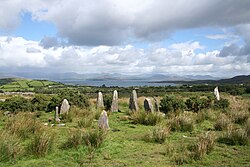Ardgroom (Irish: Dhá Dhrom, meaning 'two drumlins')[1] is a village on the Beara peninsula in County Cork, Ireland. Its name refers to two gravelly hills deposited by a glacier, Dromárd and Drombeg. It lies to the north west of Glenbeg Lough, overlooking the Kenmare River estuary. It sits between the coast and the Slieve Miskish Mountains. The village contains a shop, post office, a petrol station and "The Village Inn" pub.
Ardgroom
Dhá Dhrom | |
|---|---|
Village | |
 "Ardgroom SW" ("Canfea") stone circle | |
| Coordinates: 51°44′03″N 9°53′49″W / 51.7343°N 9.8969°W | |
| Country | Ireland |
| Province | Munster |
| County | County Cork |
| Time zone | UTC+0 (WET) |
| • Summer (DST) | UTC-1 (IST (WEST)) |
| Irish grid reference | V690553 |
Stone circle
editNear the village lie a number of megalithic monuments.[2] Signposted is the stone circle to be found to the east of the village at a distance of about 1 mile, off the old Kenmare road. It has the name "Canfea" but is normally called the "Ardgroom" stone circle.[3] About 1 mile north east lie the remains of another stone circle.[citation needed]
The circle consists of 11 stones, 9 of which are still upright with one alignment stone outside the circle.[4] Unusually for a stone circle, its stones tend to taper toward points.
Also in the vicinity are the remains of at least two ring forts and a number of standing stones and stone rows.[5]
Further reading
edit- Martin Verling, ed. (2003). Beara Woman Talking: The Lore of Peig Minihane. Folklore from the Beara Peninsula. Cork: Mercier Press. ISBN 9781856354172.
References
edit- ^ "Dhá Dhrom / Ardgroom". logainm.ie. Placenames Database of Ireland. Retrieved 22 May 2021.
- ^ Murphy, Cornelius (1997). The Prehistoric Archaeology of the Beara Peninsula, Co. Cork. Department of Archaeology. University College Cork.
- ^ "Ardgroom SW stone circle". megalithia.com. Retrieved 22 May 2021.
- ^ "Ardgroom Outward (Stone Circle) - Ireland". themodernantiquarian.com. The Modern Antiquarian.com.
- ^ Recorded Monuments Protected under Section 12 of the National Monuments (Amendment) Act, 1994 - County Cork (PDF). National Monuments and Historic Properties Service. 1998. p. 97.
